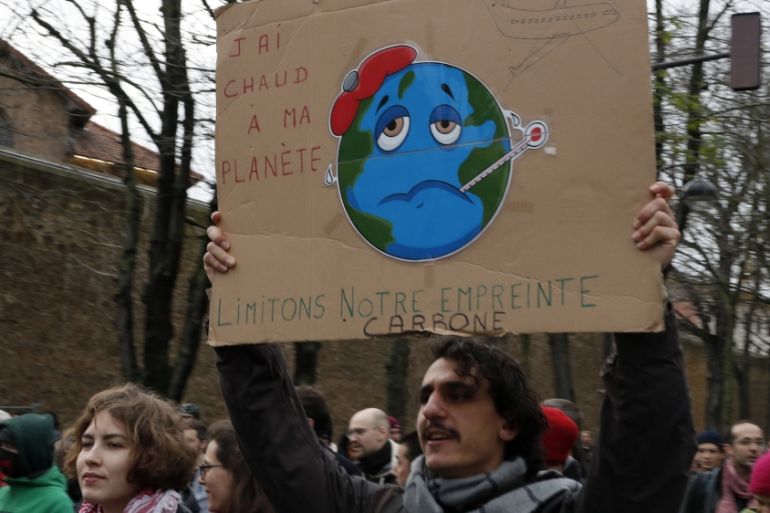Climate change is the world’s biggest risk, says WEF
Extreme weather, biodiversity loss could disrupt global economy in next 10 years if no action is taken, new report says.

Environmental disasters are by far the biggest risks facing the world over the next ten years, posing a significant threat to social and economic stability, according to a survey by the World Economic Forum (WEF).
For the first time in the history of the survey, environmental catastrophes make up the top five risks that some of the world’s most influential people and companies believe are most likely to happen, the WEF’s annual Global Risk Report for 2020 said.
Keep reading
list of 4 itemsAre seed-sowing drones the answer to global deforestation?
Rainfall set to help crews battling wildfire near Canada’s Fort McMurray
How India is racing against time to save the endangered red panda
The WEF survey, now in its 15th year, interviewed 750 global experts and decision-makers, who sounded the alarm on the devastating impacts of climate change.
Most of the stakeholders interviewed for the survey said economic divisions and geopolitical disorder are their greatest concerns. But younger respondents said they were most concerned about environmental issues, both in the short and long terms.
Extreme heatwaves, the destruction of ecosystems and deteriorating health due to pollution are the top short-term risks, according to WEF’s respondents born after 1980.
They also believe that the effects from environmental risks by 2030 will be more catastrophic and more likely than they are today.
“The good news is that the window for action is still open, if not for much longer,” said WEF President Borge Brende.
“Unless stakeholders adapt multilateral mechanisms for this turbulent period, the risks that were once on the horizon will continue to arrive,” he said.
The severity of environmental risks could be made worse by additional economic and political disruptions. Of the respondents, 78 percent said they expect “economic confrontations” and “domestic political polarisation” to rise in 2020.
Pension funds may face catastrophic shortfalls – and in areas vulnerable to extreme weather conditions such as Florida, the mortgage market may suffer mass defaults if homes become uninsurable over time
Although large countries will experience the highest economic costs, the WEF said smaller and poorer countries face a higher risk of “exposure, death and non-economic costs”.
The benefits of biologically diverse ecosystems, which capture vast amounts of carbon and provide significant economic benefits, are estimated at $33 trillion per year, the equivalent to the gross domestic product of the United States and China combined, said the WEF.
But these ecosystems are at increasing risk, especially as human activity has already caused the loss of 83 percent of all wild mammals and half of all plants, which are key components of our food and health systems.
Economic deadlock could spell further trouble for the environment. Although there are financing roadmaps for green energy, there are serious funding gaps for overall plans to mitigate and adapt to climate change, according to the WEF.
Moreover, investments in climate-related activities largely stay within wealthy nations’ borders, with only 49 developing countries having quantifiable climate-financing targets.
“Climate and corresponding economic risks threaten a 2008-style systemic collapse, unless net human-caused carbon dioxide emissions fall by 50 percent by 2030 relative to 2010, and to net zero by 2050,” the WEF said.
But tensions exist between calls for a green society and the desire to use carbon-heavy projects such as roads, dams, mines and ports to boost economic growth, especially in developing economies.
For instance, coal power plants built in Asia in the past ten years accounted for nearly one-third of the total increase in carbon dioxide emissions in 2018, and global annual subsidies for fossil fuels are approximately double those for renewable power, the WEF said.